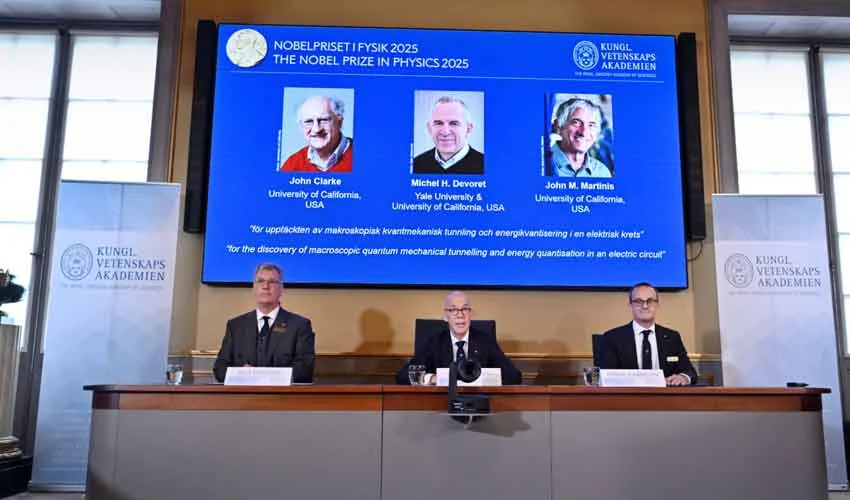Stockholm, Sweden
Scientists John Clarke, Michel Devoret, and John Martinis have been awarded the 2025 Nobel Prize in Physics for their groundbreaking work on the intersection of quantum theory and tangible technology, the Royal Swedish Academy of Sciences announced on Tuesday. The three US-based laureates were cited for “the discovery of macroscopic quantum mechanical tunnelling and energy quantisation in an electric circuit.”
The discovery resolves a fundamental question in physics: whether the “weirdness” of quantum mechanics—effects usually confined to the scale of atoms and particles—could be observed and harnessed in systems large enough to be seen and engineered by humans.
“This year’s Nobel Prize in Physics has provided opportunities for developing the next generation of quantum technology, including quantum cryptography, quantum computers, and quantum sensors,” the prize-awarding body said in its statement. Their experiments, conducted using superconducting circuits, proved that collective particles could behave as a single quantum entity, laying the foundation for modern superconducting quantum computers.
The Nobel physics prize, awarded by the Royal Swedish Academy of Sciences, carries a total prize sum of 11 million Swedish crowns (approximately $1.2 million), which will be shared among the winners.
Physics was the first category mentioned in the will of Alfred Nobel, who established the prizes after amassing a fortune from his invention of dynamite. The prize has historically celebrated some of the most influential figures in scientific history, including Albert Einstein, Marie and Pierre Curie, and Niels Bohr, a pioneer of quantum theory.
Last year’s award went to US scientist John Hopfield and British-Canadian Geoffrey Hinton for breakthroughs in machine learning that spurred the artificial intelligence boom.
In keeping with tradition, the physics award is the second Nobel announced this week, following the medicine prize on Monday, which recognized two American and one Japanese scientist for their research into the immune system. The chemistry prize is scheduled to be announced on Wednesday.
The science, literature, and economics prizes are formally presented to the laureates by the Swedish King at a grand ceremony in Stockholm on December 10, the anniversary of Alfred Nobel’s death, while the Peace Prize is awarded in a separate ceremony in Oslo.



